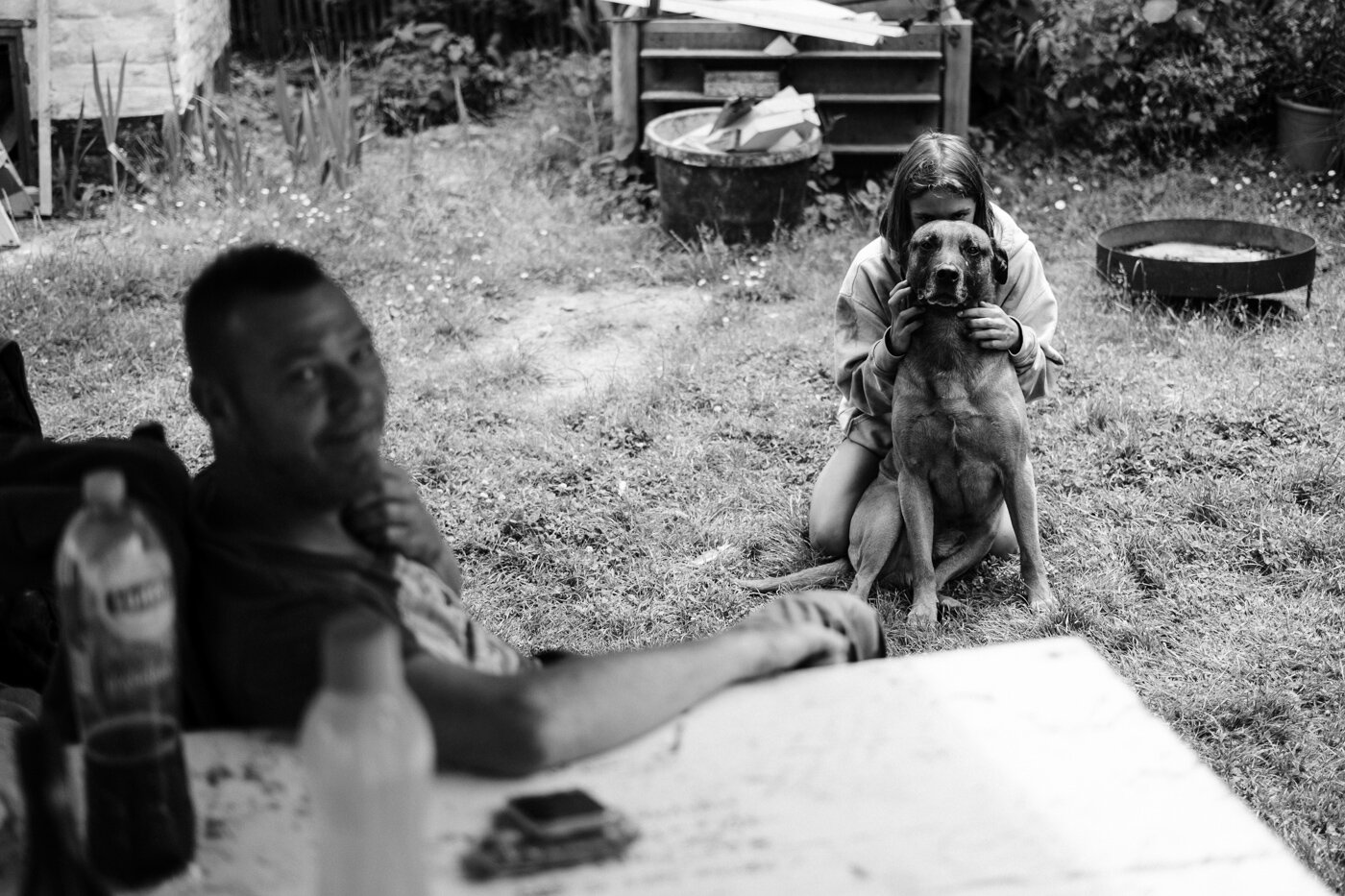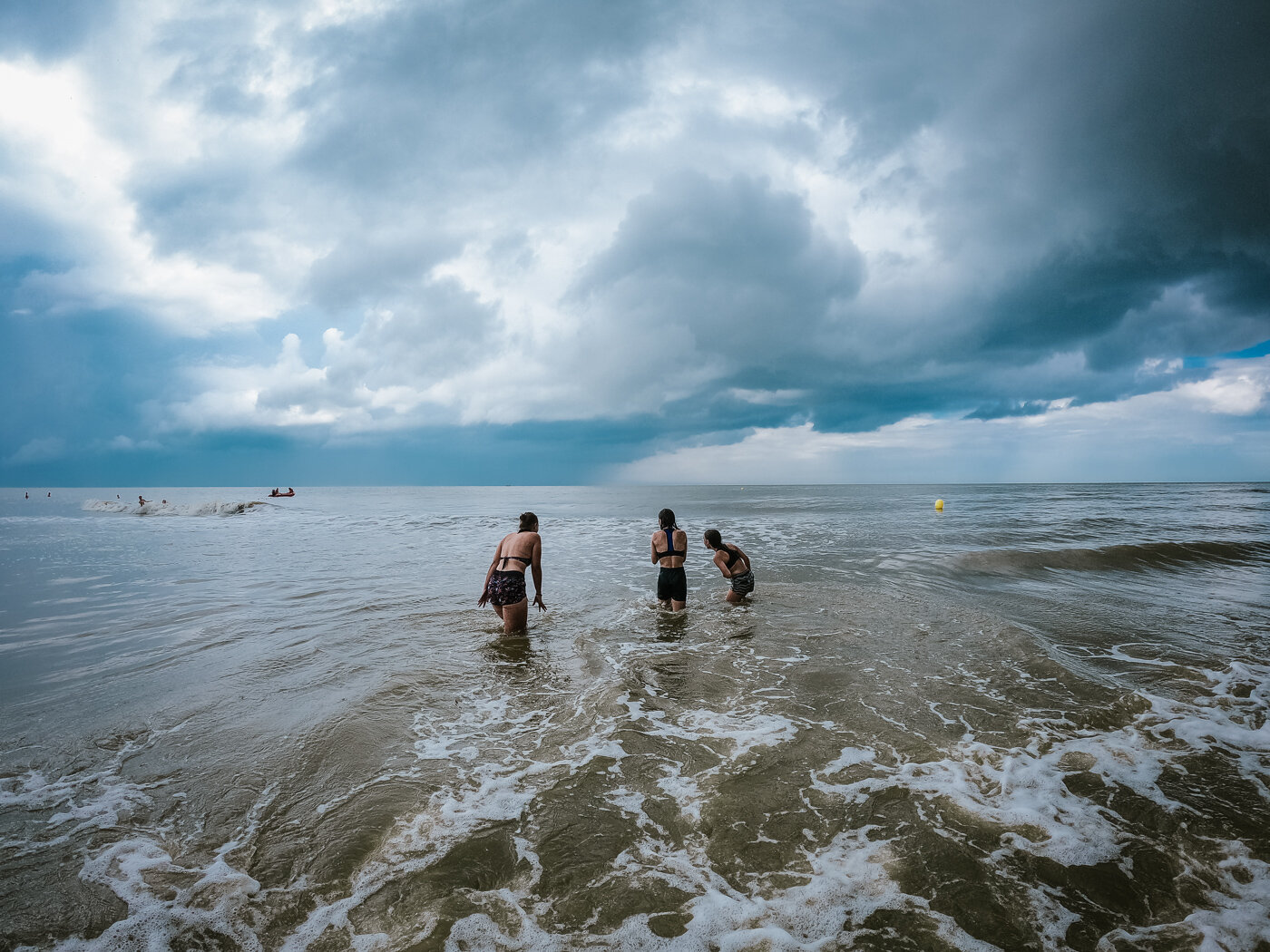Be Prepared to Break your Camera - 24 hours at the Coast

Can you afford to break your camera? I think you should!
To be clear, I’m not saying you should be careless with your gear. In fact, I take pretty good care of my stuff. But in the end a camera is a tool to capture images. And what’s the point of having a camera if you can’t take it out when circumstances are less than ideal? In this blog, I’ll share some strategies that I use to be able to shoot in any conditions. I’ll use a very short trip to the coast last summer as an example.
It all started out pretty well, great weather and a safe backyard.
As we walked towards the beach the clouds started to roll in and you could feel change in the air. It was still warm and enjoyable but you just felt that for once the weather forecast was spot on when it predicted a storm rolling in.
We decided to enjoy the nice weather while it lasted but I also prepared for the storm.
I walked back to the car to change cameras. My X-Pro3 is weather sealed and so is the XF33mm F1.4 that I was testing at the time. I wouldn’t hesitate to take it out in the rain while on a job but that doesn’t mean I want to expose it to sand, salt water, theft and rain on a family trip. The X-Pro3 is one of the main tools I make money with, so I decided to store it safely in the car and switch it out for some other gear.
Strategy 1 - Have a camera that you can afford to break
There are different ways to achieve this, depending on your budget and how much the pictures are worth to you. The cheapest way is to use an old camera that you can afford to break. I don’t keep all my old gear when I buy something new, but I always keep one or two old cameras around. After a number of years of professional use, these cameras are battered and practically worthless on the second hand market. But they still work perfectly fine. Digital cameras drop down in price really fast. Use that to your advantage and keep an old camera around or buy one for nearly nothing on the second hand market. Maybe look on Ebay to find that camera that you dreamt about but couldn’t afford 10 years ago.
If capturing life is as important to you as it is to me, you might even consider to invest in a great new camera that you can afford to break. For me that’s the FujifilmX100V. Although I use it regularly for assignments, it’s not absolutely necessary to have one. The X100-series to me, as always been about an always-with-me-camera. That means that I’m also willing to have it with me when the conditions are not so favorable. The weather sealing gives me some peace of mind. And I use a Nisi protection filter to complete the weather sealing. I still take care of the camera because it doesn’t come cheap but I’m willing to accept if at some point something happens to it. I go as far as to set aside enough money to replace it, if it would break (touch wood).
I may be a decent photographer but I’m a lousy business person, so an X100V is a substantial investment. But it’s a cost I’m willing to pay because capturing life is such an important part of what I’m about. Your budget and position might be different, but I’m sure there’s a 6 megapixel point-and-shoot in a drawer somewhere waiting for a second life.
Strategy 2 - Invest in protection
Some setups are better suited for “hostile” environments than others. A well built, weather sealed camera and lens are way less likely to break (on the other hand when it breaks it will be more costly to replace). There are plenty of other ways to protect your gear, here are some ideas:
Lens hood: I generally keep the hoods on my lenses. They do an amazing job in protecting the front element agains scratches and water.
Protection filters: I usually will not put a protection filter on my lens. Lenses are not designed with that extra piece of glass in front of it in mind. A filter can cause image degradation which is something that doesn’t make sense if you’ve invested in good lenses. However I have protection filters in different sizes for when I’m working in adverse conditions. And to be honest, I rarely see a substantial decrease in image quality with a filter on. In my opinion, you probably don’t need the really expensive top end filters but you might stay away from the cheapest ones. A good middle of the range filter is what I’d go for.
Rain covers: These are cheap and surprisingly effective. A plastic bag and some rubber bands work fine too. The big downside is that raincovers don’t exactly offer a nice user experience.
Flexible Water Housings: When used correctly, they offer fantastic protection to your gear. Not just against water but also against dust, sand, … The biggest downside: they are a bitch to use. Keep your camera on automatic settings so you only need the shutter button.
Hard Water Housings: These offer optimal protection and still let you use (most) of the controls pretty easily. They might be a bit overkill for shooting in the rain but better safe than sorry. The main downsides are that they can be pricey to outright expensive and they add bulk and weight. Keep in mind that a housing is only as effective as it’s weakest point. Make sure it stays in top condition to avoid costly malfunctions.
Dedicated ”bad conditions” cameras: There are still “though” point-and-shoots on the market that can take a serious beating. You could also think about disposible film cameras for occassional use. They even make waterproof ones and you’ll earn hipster points for shooting film :-)
Another great option is an action cam. The next two pictures were shot with my GoPro Hero9. Sure it’s a small sensor and a very wide lens but over the years I’ve gotten some really nice pictures out of GoPro cameras.
Maybe I’ve put all kinds of disaster stories in your mind by now but I have to say that I’ve never lost a camera to weather conditions. The main point I want to make is that if you have a camera that won’t cause financial or emotional disaster should something happen, your mindset will change. You’ll take your camera out more often and make amazing memories. And is’t that what it’s all about.























